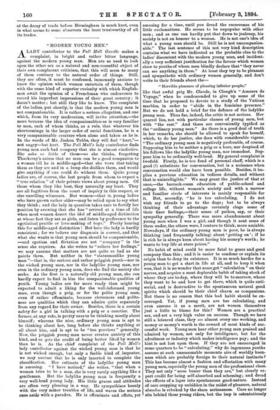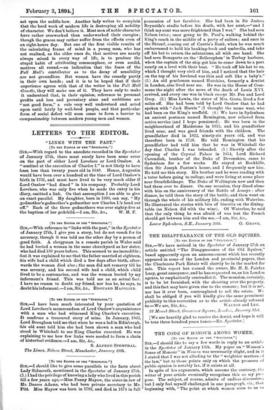"MODERN YOUNG MEN."
ALADY contributor to the Pall Mall Gazelle makes a complaint, in bright and rather bitter language, against the modern young man. Men are so used to look upon the other sex as a natural and non-resentful object of their own complacent criticism, that this will seem to many of them contrary to the natural order of things. Still, they are often, it must be confessed, immensely anxious to know the opinion which women entertain of them, though with the same kind of superior curiosity with which English- men await the opinion of a Frenchman who endeavours to record his imperfect impressions of their great country ; it doesn't matter ; but still they like to know. The complaint of the ladies, put shortly, is that the modern young man is not companionable. It is rather a serious allegation, and one which, from its very moderation, will invite attention,—the more because the idea of companionableness is very familiar to men, each of whom thinks, as a rule, that whatever his shortcomings in the larger order of social functions, he is a very companionable creature when alone and taken as he is. In the words of Mr. Joshua Tubbs, they will feel " hurt"— not angry—but hurt. The Pall Mall's lady contributor finds young men such bad company that she is almost vindictive. She asks so little of them—so she thinks, forgetting Thackeray's axiom that no man can be a good companion to a woman till he is middle-aged—that she vows that taking them as they are and in a lump she dislikes them, and would give anything if one could do without them. Quite young ladies are, of course, the last people from whom to expect a "true relation" of their private views about young men. Of those whom they like best, they naturally say least. They are all fugitives from the court of inquiry in this respect, or else unwilling witnesses. But women—that is, young ladies who have grown rather older—may be relied upon to say what they think ; and the lady in question takes care to fortify her position by avowing that she has "arrived at a time of life when most women desert the idol of middle-aged distinction at whose feet they sat as girls, and listen by preference to the egotistical prattle or love-making of boys." Pretty hearing this for middle-aged distinction ! But here the lady is hardly consistent ; for we believe our diagnosis is correct, and that what she wants is that young men should be companionable, —and egotism and flirtation are not " company " in the sense she requires. As she writes to "relieve her feelings," we may assume that matters are not quite so bad as she paints them. But neither in the "statesmanlike young man "—that is, the serious and rather priggish youth—nor in the wicked young man, nor in the ladylike young man, nor even in the ordinary young man, does she find the society she seeks. As the first is a naturally old young man, she can hardly expect to find in him the companionable qualities of youth. Young ladies are far more ready than might be expected to admit a liking for the well-informed young man, even though a prig, or for the polite young man, even if rather effeminate, because cleverness and polite- ness are qualities which they can admire quite separately from any regard for their owner. Besides, there is a certain safety for a girl in talking with a prig or a courtier. The former, at any rate, is pretty sure to be thinking mostly about himself; whereas the nice, ordinary young man is apt to be thinking about her, long before she thinks anything at all about him, and is apt to be "too previous" generally. Now, the priggish young man never creates anxiety of this kind, and so gets the credit of being better liked by women than he is. As the chief complaint of the Pall Mall's lady contributor against the wicked young man is that he is not wicked enough, but only a feeble kind of. impostor, we may assume that he is only inserted to complete the classification. Her estimate of the ladylike young man is amusing. "I have noticed," she writes, "that when a woman tries to be a man, she is very rarely anything like a gentleman. But the ladylike young man is frequently a very well-bred young lady. His little graces and attitudes are often very pleasing in a way. He sympathises keenly with the very minor troubles of life, and waves the serious ones add* with a paradox. He is effeminate and effete, yet amusing for a time, until you dread the recurrence of his little exclamations. He seems to be unpopular with other men ; and as one can hardly put that down to jealousy, his society is not an honour to a woman. He is not one's idea of what a young man should be. Still he is not uncompanion- able." The last sentence of this not very kind description contains what we have indicated as the probable clue to the ladies' discontent with the modern young man, and incident- ally a very sufficient justification for the favour which women show to youths of whom men blindly declare that" they never can see anything in them." At least they try to be pleasant and sympathetic with ordinary women generally, and don't write to their friends about the— "Horrible pleasure of pleasing inferior people,"
like that awful prig Mr. Claude, in Clough's "Amours de Voyage," when he condescended to give up some of the time that he proposed to devote to a study of the Vatican marbles, in order to "abide in the feminine presence." But we do not hold a brief for the defence of the ladylike young man. Thus far, indeed, the critic is not serious. Her quarrel lies, not with particular classes of young men, but with "the rest." And these are conveniently typified as the "ordinary young man." As there is a good deal of truth in her remarks, she should be allowed to speak for herself, which, to do her justice, she does with considerable vigour. "The ordinary young man is negatively preferable, of course. Supposing him to be neither a prig or a bore, nor despised of his fellows like the ladylike young man, nor immodest. Sup- pose him to be ordinarily well-bred. My general complaint is twofold. Firstly, he is too fond of personal chaff, which is a good (P) substitute for conversation, but is a nuisance when conversation would else have been possible. Besides, it im- plies a previous education in tedious details, and without that is unintelligible." We may grant the justice of that at once,—the barrack-room education of public-school and college life, without women's society and with a narrow and familiar circle of interests is mainly responsible for it. But, secondly, "he is too calculating. I do not wish my friends to go to the dogs ; but to be always thinking of their advantage certainly clogs some of their finer feelings,—their sense of pathos, say, or their sympathy generally. There was more abandonment about young men when I was a girl, and though it sent some of them under, the others were, I venture to think, more amiable. Nowadays, if the ordinary young man is poor, he is always thinking (and frequently talking) about getting on '; if he is rich he is always keen about having his money's worth; he wants to buy life at store prices."
No habit of mind could be more fatal to grace and good company than this ; and it is easier to condone or explain its origin than to deny its existence. It is so much harder for a young man to get a start in life at all, and to keep it when won, that it is no wonder that some get" calculation" on their nerves, and acquire a most deplorable habit of taking stock of where they are to-day, where they will be to-morrow, where they want to be and how to get there, which is quite anti- social, and is destructive to the spontaneous natural good spirits which should be their chief charm as companions. But there is no reason that this bad habit should be en- couraged. Yet, if young men are too calculating, and even assume it as a merit, are not women themselves just a little to blame for this ? Women are a practical sex, and set a very high value on success. Though we have still a leisured class, they see almost every one working, and money or money's worth is the reward of most kinds of suc- cessful work. Young men hear other young men praised and admired by women, not only for intelligence, but for the adroitness or industry which makes intelligence pay; and the hint is not lost upon them. If they are not encouraged in some quarters to be "calculating," why do ingenuous youths assume at such unseasonable moments airs of worldly keen- ness which are probably foreign to their natural instincts This has become almost a fashion and affectation with many young men, especially the young men of the professional class. They not only "seem busier than they are," but clearly ex- pect credit for being self-absorbed and scheming ; and dread the effects of a lapse into spontaneous good-nature. Instead of care cropping up unbidden in the midst of pleasure, natural abandon is rebuked by the sham seriousness. Care no longer sits behind these young riders, but the imp is ostentatiously set upon the saddle-bow. Another lady writes to complain that the hard work of modern life is destroying all nobility of character. We don't believe it. Most men of noble character have rather overworked than underworked their energies ; though the graces may rather suffer from the effects even of an eight-hours day. But one of the first visible results of the calculating frame of mind in a young man, who has not realised, as the older ones do, that motives are nearly always mixed in every way of life, is to produce the stupid habit of attributing commonplace, or even sordid, motives all round,—an indication that the fears of the Pall Mall's contributor as to the decay of sensibility are not groundless. But women have the remedy partly in their own hands ; and it is to be hoped that if their experience agrees with that of the writer in the Pall Mall ‘Gazette, they will make use of it. They have only to make it understood that, in their opinion, reference to personal profits and loss and pecuniary aims and ambitions are not good form," a rule very well understood and acted apon until lately by well-bred people, and that particular form of social defect will soon cease to form a barrier to .companionship between modern young men and women.



































 Previous page
Previous page